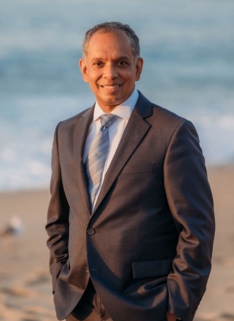Announcing the new chief of the Division of Hematology-Oncology at UCSF Health
Dear Colleagues:
 I am thrilled to announce that Krishna Komanduri, MD, an international leader in the fields of hematology-oncology, transplantation, and cellular immunotherapy, has accepted my offer to become the chief of the Division of Hematology-Oncology based at UCSF Health. He will start at UCSF on July 1.
I am thrilled to announce that Krishna Komanduri, MD, an international leader in the fields of hematology-oncology, transplantation, and cellular immunotherapy, has accepted my offer to become the chief of the Division of Hematology-Oncology based at UCSF Health. He will start at UCSF on July 1.
In addition to his role as division chief, Krishna will also assume two newly created roles: physician-in-chief of the Helen Diller Family Comprehensive Cancer Center (HDFCCC) as well as the clinical director of the UCSF Living Therapeutics Initiative. As division chief, he will also hold the Julius R. Krevans Distinguished Professorship, named after UCSF’s late dean and chancellor (and a hematologist).
Krishna received his bachelor’s degree from MIT, majoring in Biology with a secondary concentration in English Literature. He completed medical school at the University of Minnesota and then medicine residency at UCLA. In 1994, he came to UCSF for hematology-oncology fellowship, including postdoctoral training in the lab of Mike McCune at the Gladstone Institute, and then joined our faculty as assistant professor.
In 1999, Krishna was recruited to the University of Texas M.D. Anderson Cancer Center in Houston as a physician-scientist. While there he served as director of the BMT fellowship program and associate director of the Hematology/Oncology Fellowship, and he received the Division of Cancer Medicine Leadership in Education Award. In 2008, he moved to the Sylvester Comprehensive Cancer Center at the University of Miami, where he has held several key leadership roles, including director of the Adult Stem Cell Transplant Program, associate director for Clinical Innovation, and, since 2019, chief of a newly formed Division of Transplantation and Cellular Therapy. Under his leadership, cellular therapy programs have rapidly expanded at Sylvester, and the program has achieved national prominence in clinical care and research.
Krishna has held several major leadership positions in the field of hematologic malignancies and transplantation. He served as president of the American Society for Transplantation and Cellular Therapy (ASTCT), the major professional society for his field. He chaired the American Society of Hematology Scientific Committee on Immunology and Host Defense, and he serves on the Board of Directors of the National Marrow Donor Program. He was a founding member of the MIT Financing of Curative Therapies in the US (FoCUS) think tank, which is developing strategies to ensure broad access to curative cell and gene therapies. He is chair of the ASTCT’s Cellular Therapy Committee and chair-elect of its Government Relations Committee.
Krishna’s own research, which is both lab-based and translational, focuses on improving the outcomes of patients undergoing transplantation for hematologic malignancies, as well as the use of immune-based therapies for all cancers. He has authored or co-authored six books and 125 articles in the peer-reviewed literature. He has been a PI or key investigator on more than a dozen grants and has served as a member of several NIH study sections. He is an elected member of the American Society of Clinical Investigation (ASCI).
This couldn’t be a more exciting time to assume the helm of our Division of Hematology-Oncology. The division is comprised of 222 people, including 79 faculty. Each year, it manages 82,000 ambulatory visits and sees approximately 10,000 new patients (ambulatory plus inpatient consults), with much of the ambulatory care delivered in our spectacular new Precision Cancer Medicine Building (PCMB) at Mission Bay. Cancer is a cornerstone of UCSF Health’s strategic plan, and several new UCSF-affiliated cancer centers have been launched or are planned around the Bay Area. The division receives $40M per year in extramural funding, has more than 500 active clinical trials, and its faculty and trainees publish about 450 articles each year. It has strong clinical and research programs in all of the major clinical specialties of hematology and oncology, as well as in innovative areas such as immunotherapy, global oncology, medical education, palliative care and survivorship, and health disparities.
Krishna will return to the Bay Area with his wife Elena. He has three daughters (identical triplets) in college – one at UC Davis – and a son in high school.
As division chief, Krishna takes over from Andrew Ko, co-interim chief for oncology, and Tom Martin, co-interim chief for hematology and hematologic malignancies. While being an interim leader is always challenging, over the past three years Andrew and Tom have skillfully moved the division forward at a time of major change and disruption. I am grateful to them. I also thank Eric Small, who stepped down as division chief in 2018 to become the chief scientific officer for the HDFCCC, for his many years of leadership and his continued partnership with the division.
I am grateful to the search committee, chaired by Jonathan Terdiman, chief of the GI Division at UCSF Health, for conducing this complex national search so adroitly. I also greatly appreciate the help of many leaders from the campus, UCSF Health, HDFCCC, and the School of Medicine, whose partnership was essential to this recruit.
There is no area in medicine in which the needs are greater than hematology and oncology, and no area in which the opportunities are more thrilling. I am confident that Krishna Komanduri will be an exceptional leader for our heme-onc enterprise, across all of our missions. Please join me in welcoming Krishna back to UCSF.
Sincerely,

Robert M. Wachter, MD
Professor and Chair, Dept. of Medicine
Holly Smith Distinguished Professor in Science and Medicine
Marc and Lynne Benioff Endowed Chair in Hospital Medicine